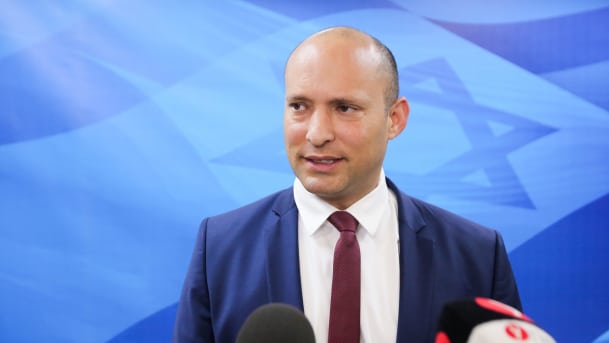Australia/Israel Review, Featured
Chaos Left and Right, as legal questions loom
Feb 1, 2019 | Amotz Asa-El

Israel’s 21st parliamentary election, which will take place April 9, could have been one of the most boring in the Jewish state’s history.
The economy is solid, highlighted by a minimal 4.1% unemployment rate, negligible 0.8% inflation, and estimated 3.2% GDP growth in 2018, underscoring a decade’s worth of economic vitality in Israel that is showing no sign of abating.
The borders are mostly relatively quiet. Even Gaza’s border, which has seen endemic Palestinian violence along the fence, has failed to inflict many casualties on the Israeli side for more than four years. Iran, Israel’s most formidable enemy, has been dealt a strategic blow by the Israeli Air Force, which has debilitated the Islamic Republic’s military buildup in Syria in repeated airstrikes over the past year.
Foreign relations have seen some considerable achievements over the four years since the previous election, most notably with the relocation of the American embassy from Tel Aviv to Jerusalem, but also with a pivotal new agreement to send Israeli natural gas to Europe via Cyprus and Greece.
Other diplomatic gains have also been registered such as Sultan Qaboos, leader of Oman, openly hosting Israeli PM Benjamin Netanyahu, shortly before the President of Chad, whose country severed ties with Israel in 1974, arrived in Jerusalem for a formal visit.
Closer to home, relations with Egypt are close, open and smooth, and relations with Saudi Arabia and other Gulf states, though quiet, are steadily warming.
And politically, Netanyahu held together a six-party conservative coalition that delivered reasonable stability at a time when a growing number of Western democracies are being shaken by surging populism.
Considering that Netanyahu is presiding over all this while 69 and healthy, with no obvious challenger on the Israeli political scene, one might have expected his grip on power to be unshakeable.
It isn’t.
The Netanyahu era that began when he returned to power in early 2009, a decade after his first premiership ended in defeat, may now be coming to an end – though not because of the approaching election, but despite it.
What primarily threatens his position is not any rival party or candidate, but the legal allegations of which he has become accused during his fourth consecutive premiership.
Police investigators recommend pressing charges over three different corruption allegations. Whether or not to indict is now up to Attorney-General (A-G) Avichai Mandleblit.
Netanyahu’s sudden assembly of his coalition partners in December to jointly agree to bring the election forward half-a-year was formally explained by his difficulties in managing the coalition with only 61 of 120 lawmakers. This situation was created by Avigdor Lieberman’s resignation last November as defence minister, taking his Yisrael Beitenu (“Israel our home”) faction out of the governing coalition.
However, pundits suspect the new date was chosen with the hope of leaving the A-G insufficient time to hold a pre-indictment hearing on Netanyahu’s cases prior to the election.
Mandleblit, for his part, is now working feverishly with his staff in order to meet his self-imposed deadlines and emerge with a decision, one way or another, in upcoming weeks.
Legally speaking, Israeli law requires that an indicted cabinet minister resign. However, this is not true of an indicted prime minister, or even a convicted prime minister, so long as he or she has not exhausted all appeals. The rationale is to reduce to a minimum the judiciary appearing to undo the verdict of the voters.
Politically, however, an indicted prime minister obviously arrives at the ballots bruised, in the best case, crippled in the worst. Moreover, an indicted Netanyahu might lose the support of some coalition partners, who will demand that someone else from Likud serve as prime minister until and unless he is legally cleared.
In the current coalition, Finance Minister Moshe Kahlon, head of the Kulanu party, has already said that, if indicted, Netanyahu will not be able to serve as prime minister. This view will likely be similarly harboured by others in Netanyahu’s coalition after the election, should he win.
If forced to resign by potential coalition partners, Netanyahu would be replaced by someone else from Likud, possibly while himself remaining in government. The leading candidates for this thankless role are either Transport Minister Yisrael Katz or former interior minister Gideon Sa’ar, depending on how they fare in the Likud primaries in February.
Understandably, then, Netanyahu has been attacking “the left” and “the media” for demanding an indictment that he claims lacks factual foundations and will ultimately not stand. Netanyahu has already said he will not resign before the election even if summoned for a hearing into potential indictment.
That is why the approaching election is unfolding as a legal drama, one that effectively pits Netanyahu against the judiciary – regardless of whether he is or is not indicted, whether a prospective indictment arrives before or after the election, and also regardless of whether he loses or wins.
If Netanyahu loses, he will blame his defeat on a plot against him, and if he wins, he will say the voters have not only defied the judiciary, but overruled it.
How a pre-election indictment would impact the election is anyone’s guess, but three features seem like near givens, according to all polls, pundits and politicians: Netanyahu will run in the April 9 election; Netanyahu will win; and Likud will dominate Israel’s 21st legislature, retaining and possibly slightly increasing its current 30 of the Knesset’s 120 seats.
Then again, beside the drama that will surround Netanyahu’s personal travails, there will be much partisan commotion across the political spectrum.
Within the conservative camp that four years ago won 67 seats, the main event is Education Minister Naftali Bennett’s breaking up his own Bayit Yehudi (Jewish Home) party, in favour of fielding a new party he calls Hayemin Hehadash (the “New Right”).

Naftali Bennett: A key player on the Right
The modern-Orthodox Bennett, a veteran of the elite Sayeret Matkal military unit where Netanyahu served a generation before him, wants to be defence minister, and ultimately prime minister, and knows that the sectarian Jewish Home was unlikely to get him there.
The 46-year-old Bennett and his secular ally Justice Minister Ayelet Shaked, 42, assumed that the bulk of their eight-member Jewish Home faction’s voters will follow them into the new party, along with many of Netanyahu’s secular voters who want a harder line vis-à-vis Hamas in Gaza.
Polls, however, indicate that the elitist Bennett, a hi-tech entrepreneur and self-made millionaire, and Shaked, an electric engineer, are failing so far to draw many voters from outside the Jewish Home party’s original constituency. Bennett, once Netanyahu’s chief of staff but now a sworn rival, hopes that if Netanyahu is indicted, a critical mass of Likud voters will defect to the New Right.
As things currently seem, what the emergence of the New Right might cause is the disappearance of their former Jewish Home party, the successor to the historic National Religious Party (NRP) that had served in almost every Israeli government since 1948.
As of now, polls indicate that Jewish Home will fail to pass the 3.25% electoral threshold in the wake of defections of Bennett and Shaked, the party’s former leader and second highest profile minister respectively. Since the law says that votes for a party that did not pass the electoral threshold are not counted, Bennett’s move might mean lost votes for the overall conservative Knesset bloc.
A similar syndrome might plague the right’s opposite flank, where Finance Minister Kahlon’s centrist Kulanu faction is also struggling in the polls to cross the threshold. Former Defence Minister Avigdor Lieberman’s Yisrael Beteinu party is not faring much better.
The result of this reality might be that some factions will merge as the elections approach, possibly with Kahlon and/or Lieberman returning to the Likud, where both their political careers began.
Whatever happens to Likud’s satellites, and whatever Netanyahu’s personal legal situation the morning after the election, chances are Likud will want at least one coalition partner from beyond the conservative camp, both because some satellite conservative parties will likely fail to get returned to the Knesset, and because Likud will want to punish Bennett for having betrayed Netanyahu and splintered the right-leaning bloc.
Meanwhile, out in the realms beyond Likud’s sway, where alternative partners sprawl between the centre-right and the centre-left, the situation is no less chaotic and unsettled than it is on the right.
Two major developments are shaping the dynamics outside the conservative camp: the rise of a new centre-right party, and the breakup of the center-left Zionist Union.
The new party is Hosen Leyisrael (“Resilience for Israel”), headed by former Lt-Gen (res.) Benny Gantz, a former IDF chief of general staff, an officer whose illustrious military career includes two years as the IDF’s military attaché in Washington.

Benny Gantz: A new centrist alternative
Tall, handsome, and soft-spoken, Gantz has yet to publicly pronounce his political views, but he is widely assumed to be a middle-of-the-road pragmatist. Reports claim he is negotiating a joint ticket with hawkish former defence minister Moshe Yaalon, who also once served as IDF chief of staff, and fell out with Netanyahu in 2016.
Polls, at any rate, consistently show Gantz standing to win some 15 Knesset seats. This prospective windfall comes in large part at the expense of former finance minister Yair Lapid and his centrist Yesh Atid (“There is a Future”) faction, which currently has 12 Knesset seats, and was forecast to grow by some 50% until Gantz came along.
If Gantz indeed wins the predicted chunk of the electorate, he will likely want to join a Likud-led coalition, possibly as defence or foreign minister. What his attitude would be if Netanyahu is indicted, Gantz has yet to say.
Meanwhile, on the centre’s left flank, Labor leader Avi Gabbay has publicly broken his party’s alliance with former foreign minister Tzipi Livni. The two never got along. Gabbay felt Livni was plotting his removal, and also pulling their alliance to the left despite his efforts to shift Labor toward more hawkish views on the Palestinian front.
Like Bennett’s schism, Gabbay’s might also strand its smaller part, Livni’s Hatnua faction (“The Movement”), outside the Knesset. Labor itself is forecast to win a bare 10 seats, a historic low for the party that was created by Israel’s founding father David Ben-Gurion.
Lastly, schism is also plaguing the far left, where veteran MK Ahmad Tibi, a 60-year-old gynecologist, has split the United List, a coalition of four factions led by Arab Israelis. Tibi’s Ta’al Party is predicted to win six seats, the same as the rump United List, which in the outgoing Knesset had 13 seats.
All told, come April, Israel may well likely see Netanyahu re-empowered electorally while politically embattled and legally besieged. Even by the standards of Israel’s ordinarily eventful politics, the situation will be unprecedented and unpredictable – and also rather unpleasant.
Tags: Israel






